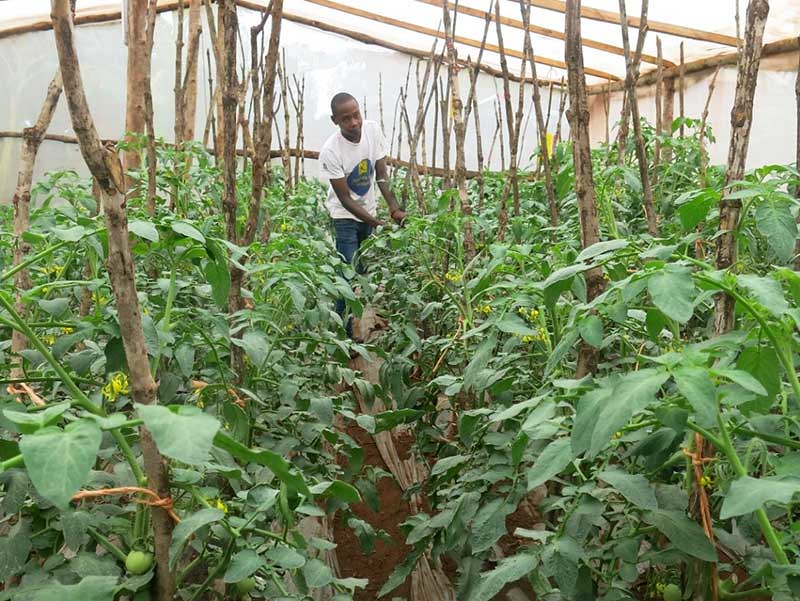Youth proud to be part of a farming family
Siblings Ana and Pascal Erasto dig in to continue a family tradition in Tanzania through the Africa RISING project.
Young people in many places tend to have a negative attitude toward farming. It’s viewed as hard, dirty work with limited potential to generate income.
Pascal Erasto (19 years) and his sister Ana (16 years) have a different perspective. Their positive attitude towards vegetable production and use was influenced by their mother, Monica Pascal, who has worked as a farmer trainer in the Africa RISING project since 2013. The World Vegetable Center is a partner in the project.
Together, the family manages demonstration plots (0.25 acres in size) for the project’s Farmer Field Schools, the ‘schools with no boundaries.’ The plots
Pascal completed form four at Galapo Secondary School in 2018 in Babati District in Manyara Region, while Ana is in form four (2019) at the same school. They assisted their parents on the family farm after school and on holidays. From a very young age, they knew where their food came from. They planted maize, vegetables and other crops, which provided their family with food all year round.

‘We also raised goats and chickens for meat and eggs,’ said Pascal. ‘We ate some, and then sold the surplus. We got manure for our crops, and we fed the animals with vegetable and maize residues.’
After a screen house experiment trial was established in their field by the Africa RISING program, the family learned how to grow vegetables using protected cultivation methods. ‘Screenhouse production added value to our tomato and sweet pepper,’ Pascal says. ‘Many people prefer to buy our produce at a higher price because they have realized that vegetables grown in screen houses are healthier. The crops we produce in the screen house are not seriously affected by pests and diseases, so we can grow vegetables using less or even no pesticides at all.’

Before the project intervention, many young people in the area — including Ana and Pascal — thought farming was for youth who failed their examinations and had no other alternatives. Farming was something only old people and poor families did. Vegetables, especially traditional vegetables, were considered ‘food for the poor’ as they were mostly eaten by people with low incomes.
Through their active participation in the Farmer Field School demo plots, Pascal and Ana have realized just how essential farming is to their community – and what a great opportunity farming offers to young entrepreneurs like themselves. They now understand the importance of using good quality seeds and how to grow vegetables following Good Agronomic Practices (GAP). They have discovered ways to earn money by selling vegetables, as well how to prepare vegetables and eat them as part of a healthy diet.
‘We are now able to produce enough vegetables to feed our family, and we sell the surplus,’ said Ana. ‘We use the money we earn to pay for school education trips, and sometimes we help our parents buy household items such as sugar, soap, and salt.’
Now, when their parents travel away for a week or so, Ana and Pascal can feed themselves and include vegetables in everyday meals. ‘That was not possible before,’ said Ana. ‘But now we grow tomatoes, African eggplant, African nightshade, Ethiopian mustard, sweet pepper and onion in plots near our home, and the fresh vegetables are always nearby.’
Ana and Pascal expect to earn more money because they have increased the area under production and have added more vegetables (sweet pepper) to their crop rotation. ‘Sweet pepper fetches good prices,’ she said. ‘We are applying improved practices that we learned in the demonstration plots, and we are expecting good yields in 2019 and 2020.’
The farming demonstration plots also serve as leaning centres for the community. Since 2014, Pascal and Ana have applied the practices they learned through Africa RISING in their plots, which everyone in the village can see. Every week, between five and ten people, including schoolmates, friends, and other farmers from nearby villages stop by the plots to chat about new planting methods, a different cultivation practice, or the merits of a particular variety. Some visitors request vegetable seeds; Pascal and Ana give them the seed for free or sell it, depending on availability. ‘We process the seeds ourselves from previous vegetable harvests, because we now know how to do it better,’ said Pascal.
Said Ana: ‘The Africa RISING project and WorldVeg staff worked tirelessly in facilitating practical training in the demo plots, and this chance to learn by doing changed our mindset positively towards farming.’
‘Our future plans are to invest more in our own farm, specifically to produce vegetables,’ she said. ‘We now clearly understand that we can benefit from vegetable farming within a short season, compared to other crops. We now know that growing vegetables is business.’
This story was originally published on WorldVeg FRESH newsletter.





Latest Comments